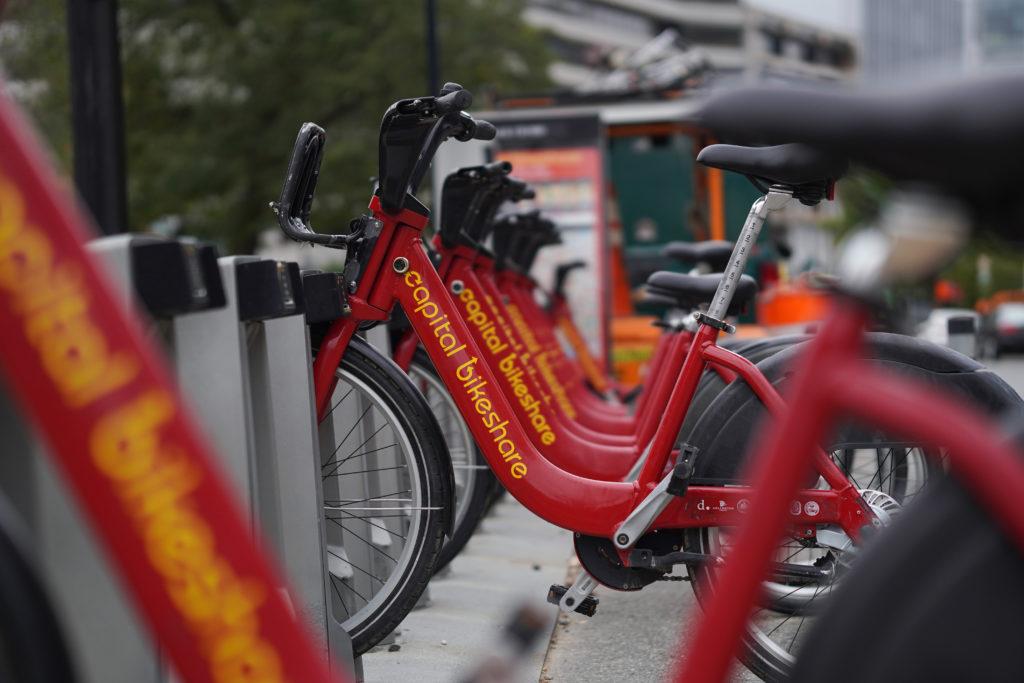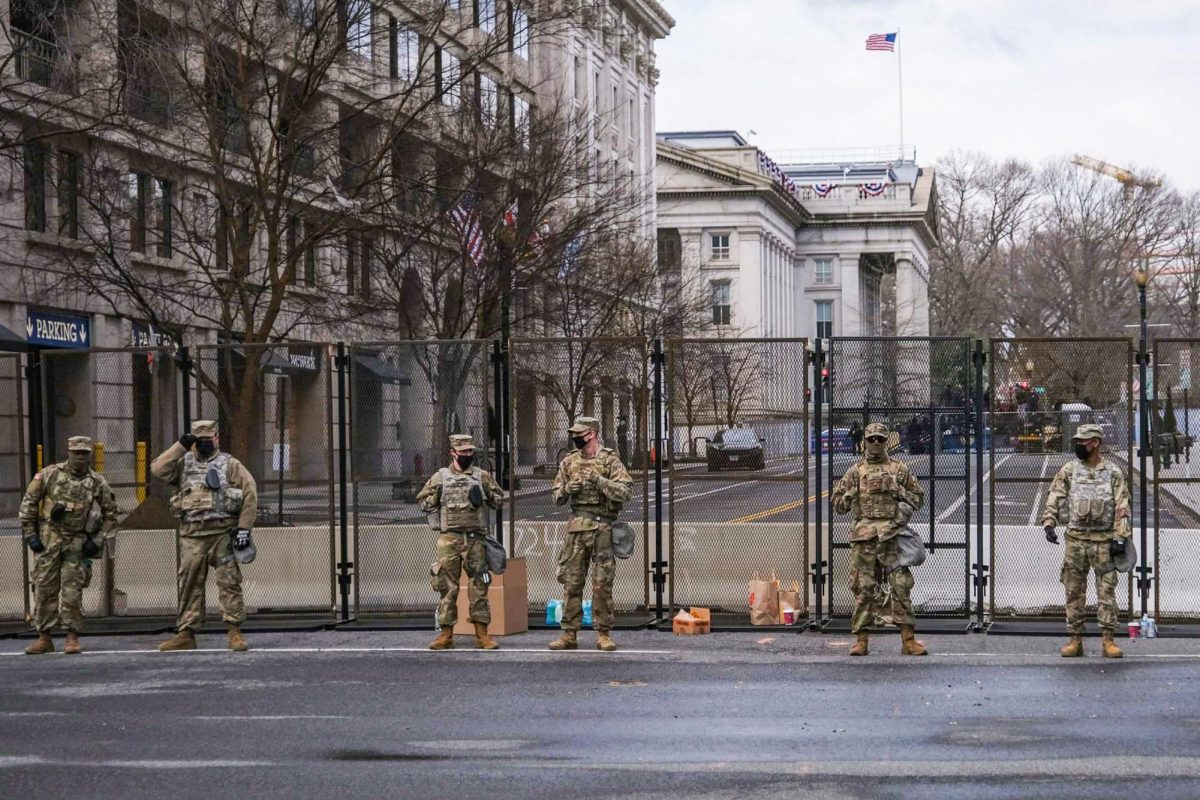Docked bicycle service Capital Bikeshare notched a decade of service in D.C. late last month.
City officials have installed five Capital Bikeshare stations with 60 bike docks across the Foggy Bottom Campus amid station expansions, the debut of electric bikes and the rollout of student discounts in the decade-long development of the program, which began Sept. 20, 2010. University spokesperson Crystal Nosal said the system has created new ways of commuting to and around campus, adding that officials hope to continue working with students and community members to expand student access to the program in the future.
“D.C. government’s bicycle master plan notes many benefits of enhancing convenient access to bicycle-sharing services to the GW community, including addressing the region’s primary source of air pollution by decreasing congestion for roads, easing burdens on crowded popular local transit services and increasing equitable, healthy and affordable transportation options,” she said in an email.
Capital Bikeshare officials did not return a request for comment.
Marina Streznewski, the president of the Foggy Bottom Association, said Capital Bikeshare has been “an important part of the transportation system” in the local neighborhood near campus. She said program officials should encourage riders to wear helmets and distribute more safety information in years ahead.
Streznewski said Capital Bikeshare is “much safer” than other bike-sharing systems because the docking stations ensure bikes don’t become obstacles scattered across the sidewalk – a safety concern locals have voiced in recent years.
“I like Capital Bikeshare a whole lot more than I like the dockless bikes and scooters, which wind up all over the sidewalks,” she said. “The fact that the Capital Bikeshare has a dock I think makes it a much safer kind of system.”
Here’s how today’s network of Capital Bikeshare stations came to campus:
Bike-sharing begins
Capital Bikeshare was preceded by a similar program called SmartBike DC, which launched in 2008 with 120 bikes and 10 stations, one located just outside of the GW Hospital. About 1,600 people joined as members within its first two years, according to the Capital Bikeshare website.
District officials initiated the Capital Bikeshare program in 2010 through a partnership with city officials from Arlington, Virginia, unveiling a selection of 100 stations in the District that would together hold about 1,100 bikes. District Department of Transportation officials selected three sites for Capital Bikeshare stations on campus – one at the existing station in front of GW Hospital, another station at 1959 E St. and a third outside The Shops at 2000 Penn.
Expanding stations
Over the years, D.C. officials and neighborhood leaders have worked to expand Capital Bikeshare’s presence around GW’s campus, both in Foggy Bottom and near the Mount Vernon Campus.
City officials installed a bike-sharing station with 16 bike slots in front of Duques Hall in 2017.
A year later, Capital Bikeshare opened another station with 16 docks near the Vern. Students said at the time that the new addition provided better access to a method of transportation than the Mount Vernon Express.
The Foggy Bottom and West End Advisory Neighborhood Commission continued the push for Capital Bikeshare’s steady expansion last year. ANC commissioners passed a resolution pressing the D.C. government to add more bikes to stations on campus.
System upgrades
City officials have discovered new ways to enhance Capital Bikeshare in more recent years.
DDOT officials created a $25 student pass last year that offered students at D.C.-area universities one year of discounted access to the Capital Bikeshare system. While regular membership would cost $85, officials signed the deal last August to give students better bike access for the entire academic year.
Nosal said officials began discussing the discount plan with the Student Association in 2017 and met with planners from Capital Bikeshare and the D.C. government to implement the discounted student membership service. She said officials have since worked to locate spots for additional Capital Bikeshare stations near campus through talks with DDOT leadership, students and community members.
Much of Capital Bikeshare’s progress in Foggy Bottom has been a product of the University’s focus on students and sustainability, Nosal said.
“In response to feedback from student leadership, to enhance the student experience and also work toward GW’s sustainability goals, the University has implemented numerous alternate transportation options including its partnership with Capital Bikeshare,” she said.
City officials introduced another upgrade to Capital Bikeshare in summer 2019 when Lyft launched a new feature that allows users to rent public bikes through their account.
In the most recent improvement to Capital Bikeshare, city officials started rolling out electric bikes this summer after a yearlong mechanical issue kept the e-bikes off city streets.
System struggles
Capital Bikeshare ridership dipped last calendar year, as single rides – which are purchased by locals who aren’t members of the program – dropped from about 80,000 rides per month in 2018 to 40,000 in 2019.
The service was dealt another blow with the onslaught of the COVID-19 pandemic, as ridership tanked by more than 60,000 rides per month in April with less than 20,000 monthly trips. Despite the ridership hit, Capital Bikeshare officials reached out to essential workers struggling through the pandemic and offered them free memberships with unlimited 30-minute rides earlier this year.
The future of Capital Bikeshare
During a difficult time for transportation, Capital Bikeshare’s numbers outline a more encouraging pre-pandemic backdrop. Membership has climbed from about 1,200 in 2010 to more than 26,500 today, and 27 million trips have covered 150 million miles. More than 600 stations and 5,000 bikes line city streets throughout the D.C.-area.
Mayor Muriel Bowser said in a press release last month that Capital Bikeshare has upheld a “crucial part of our transportation network” as officials remain hopeful for the program’s continuing success in the future.
“We look forward to the next decade of building out and expanding the Capital Bikeshare system to give even more riders a sustainable way to travel through neighborhoods, the city and the region,” she said.








